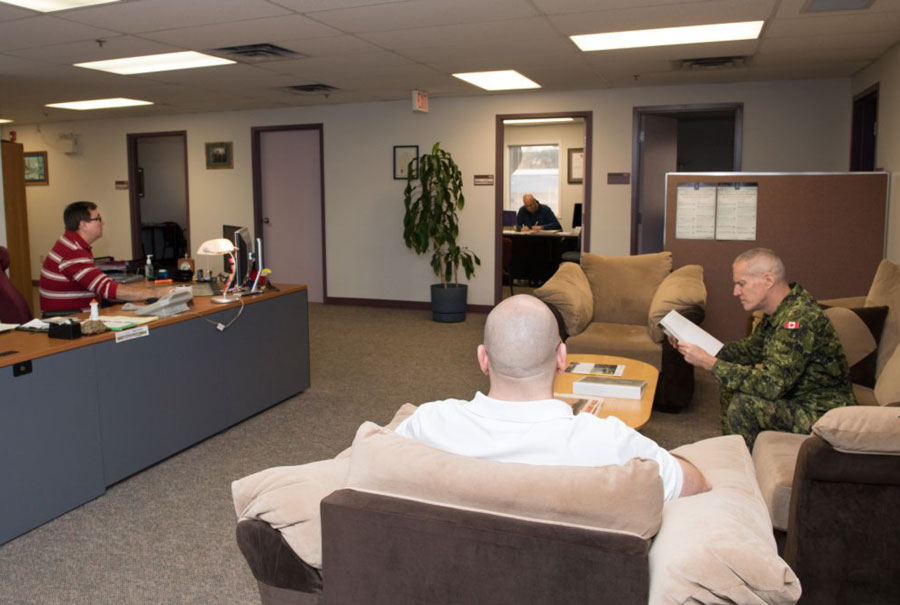Integrated Conflict and Complaint Management: From idea to implementation
Finding a solution to an organizational challenge can be difficult at the best of times. And in fact, finding the solution is the easy part. The hard part is actually implementing the solution after it’s been identified.
The path that led to the creation of Conflict and Complaint Management Services (CCMS) centres wasn’t always clear, nor was it easy. But their existence today, and the value they provide to Defence Team members and leaders, are a testament to the teamwork that focused on solving a complex organizational problem.
Identifying the Problem
“The pieces of the puzzle were all there, including our alternative-dispute resolutions, harassment and human rights complaints, and grievances,” says Alain Gauthier, Director General, Integrated Conflict and Complaint Management (ICCM). “But a lot of cases that could’ve been resolved locally and informally were coming up through formal channels, and often complaints were filed using the wrong mechanism.”
In 2011, a departmental working group was struck to consider ways of optimizing the DND (Department of National Defence)/CAF (Canadian Armed Forces) approach to managing and resolving workplace conflicts. The working group began by mapping out all conflict and complaint recourse processes. After analyzing the various mechanisms, it became clear that most were overly complex, expensive, stove-piped and unmeasured.
The fact that mechanisms resided in silos meant that each conflict-resolution process operated independently. Another problem was that there was no overarching data to understand the extent of workplace conflicts.
Developing and testing the solution
The solution emphasized the integration of the various conflict and complaint mechanisms, as well as the tracking of files across DND (Department of National Defence)/CAF (Canadian Armed Forces). In June 2016, the Armed Forces Council approved the creation of four prototype CCMS (Conflict and Complaint Management Services) centres and, in October 2016, these offices were established in Kingston, Montreal, Valcartier and Borden.
The four pilot locations helped to test the viability of the integrated model, and ultimately signaled positive results. Disputes were being resolved faster and at a lower level. Where possible, members remained involved in these processes, which helped to diminish the sense of the unknown. Through the tracking and analysis of individual complaints and resolutions, local chains of command received a better understanding of members’ needs and concerns.
Adapting the Plan
Drawing on the lessons learned from the four pilots, the next step was to expand the CCMS (Conflict and Complaint Management Services) model. In 2017, an additional 12 offices were approved, which would be located in major CAF (Canadian Armed Forces) population centres across Canada.
“The six-month pilot with the first four centres was successful and, while we originally intended to establish the 12 additional centres by 2020, that timeline was accelerated,” says Colonel Daniel Rivière, ICCM (Integrated Conflict and Complaint Management)’s Director, Service Delivery. “We saw there was an urgent need, so all offices were opened and fully operational by July 2018.”
Evaluating the Impacts
While all initial signs are positive, it’s too early to say what the full impact of the ICCM (Integrated Conflict and Complaint Management)program and the CCMS (Conflict and Complaint Management Services) centres will be. Based on anecdotal evidence, it appears that fewer complaints are being filed through formal channels, conflicts are being resolved faster and more informally, and members are responding positively to the extra support.
“These resources are coming at a time when the Forces are paying a lot of attention to members’ resilience, mental health and diversity, as well as to the issue of misconduct,” says Mr. Gauthier. “If the organization can help members and leaders address conflicts faster, it benefits all parties involved.”
“We need to do a better job of meeting the needs of our team members and their families, not just the needs of the mission,” says Chief of the Defence Staff, General Jonathan Vance. “There’s a lot happening across the organization as we emphasize our People First, Mission Always philosophy. The new CCMS (Conflict and Complaint Management Services) centres are just one demonstration of our commitment to caring for our people, and they’re offering important tools that will lead to better work environments, stronger resilience and ultimately increased operational effectiveness.”
Related Links
Integrated Conflicy and Complaint Management
Date modified: 2018-11-02
